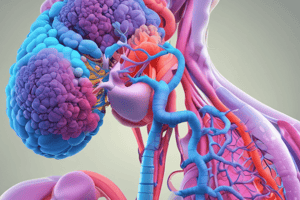Podcast
Questions and Answers
What is the term used to describe high carbon dioxide concentration in body fluids?
What is the term used to describe high carbon dioxide concentration in body fluids?
- Hypercapnia (correct)
- Alkalosis
- Acidosis
- Hypoxemia
What is the typical partial pressure of oxygen in arterial blood?
What is the typical partial pressure of oxygen in arterial blood?
- 80 mm Hg
- 100 mm Hg (correct)
- 150 mm Hg
- 120 mm Hg
Which factor significantly influences the diffusion of respiratory gases?
Which factor significantly influences the diffusion of respiratory gases?
- Temperature
- Altitude
- Blood viscosity
- Concentration gradient (correct)
What is the primary form in which most carbon dioxide is transported in the blood?
What is the primary form in which most carbon dioxide is transported in the blood?
What effect does an increase in carbon dioxide levels have on the rate of breathing?
What effect does an increase in carbon dioxide levels have on the rate of breathing?
At a partial pressure of oxygen (PO2) of 70 mm Hg, what is hemoglobin's approximate saturation with oxygen?
At a partial pressure of oxygen (PO2) of 70 mm Hg, what is hemoglobin's approximate saturation with oxygen?
The Hering-Breuer reflex serves to:
The Hering-Breuer reflex serves to:
Which of the following is a protective reflex of the lungs?
Which of the following is a protective reflex of the lungs?
Which neurons control the diaphragm during respiration?
Which neurons control the diaphragm during respiration?
What causes the oxygen-hemoglobin curve to shift to the right?
What causes the oxygen-hemoglobin curve to shift to the right?
Flashcards
Hypercapnia
Hypercapnia
The condition of having an abnormally high concentration of carbon dioxide in the body fluids.
Concentration Gradient
Concentration Gradient
The difference in concentration of a substance between two areas, driving movement from high to low concentration.
Diffusion of Respiratory Gases
Diffusion of Respiratory Gases
The process by which dissolved gases are exchanged between blood and interstitial fluids, driven by concentration gradients.
Partial Pressure of Oxygen (PaO2)
Partial Pressure of Oxygen (PaO2)
Signup and view all the flashcards
Pulmonary Edema
Pulmonary Edema
Signup and view all the flashcards
Adult Respiratory Distress Syndrome (ARDS)
Adult Respiratory Distress Syndrome (ARDS)
Signup and view all the flashcards
Carbon Dioxide Transport
Carbon Dioxide Transport
Signup and view all the flashcards
Dorsal Respiratory Group (DRG)
Dorsal Respiratory Group (DRG)
Signup and view all the flashcards
Hering-Breuer Reflex
Hering-Breuer Reflex
Signup and view all the flashcards
Protective Reflexes of the Lungs
Protective Reflexes of the Lungs
Signup and view all the flashcards
Study Notes
Respiratory Gases and Control
- Hypercapnia is high carbon dioxide concentration in body fluids.
- Arterial blood oxygen partial pressure (PO2) is typically 100 mm Hg.
- Carbon dioxide partial pressure (PCO2) in peripheral tissues is around 45 mmHg.
- Concentration gradient is a crucial factor determining respiratory gas diffusion.
- Diffusion exchanges dissolved gases between blood and interstitial fluids.
- Pulmonary edema, a lung condition, can stem from certain heart diseases.
- Fluid buildup in alveoli, leading to hypoxia, can cause adult respiratory distress syndrome (ARDS), which isn't corrected by oxygen therapy.
- At a PO2 of 70 mm Hg, normal temperature, and pH, hemoglobin is over 90% saturated with oxygen.
- Factors that shift the oxygen-hemoglobin curve to the right include increased CO2, temperature, decreased pH, and increased H+ ion concentration.
- Chronic hypoxia elevates 2,3-DPG production in the blood, potentially arising from anemia.
- Most blood carbon dioxide is transported as bicarbonate ions.
Respiratory Control Centers and Mechanisms
- The nucleus tractus solitarius in the medulla oblongata houses the dorsal respiratory group of neurons.
- Carbon dioxide is the primary chemical regulator of respiration.
- Increased blood carbon dioxide levels lead to increased breathing rate.
- Expiratory neurons control abdominal and internal intercostal muscles, while inspiratory neurons control the diaphragm and external intercostal muscles.
- The Hering-Breuer reflex prevents lung overexpansion.
- Protective lung reflexes include coughing and bronchoconstriction.
Studying That Suits You
Use AI to generate personalized quizzes and flashcards to suit your learning preferences.




